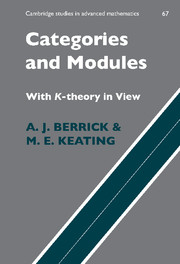2 - Categories and Exact Seqences
Published online by Cambridge University Press: 12 October 2018
Summary
The definition of an abstract category imposes few conditions on the objects and morphisms of a category, with the consequence that a great diversity of mathematical entities can be regarded as categories. In contrast, a category of modules has a richer structure than the minimum required for the definition of a category. The set of homomorphisms Hom(M, N) between two modules is always an abelian group, and we can recognise whether or not a homomorphism is an injection or surjection. Furthermore, the category may or may not contain such things as direct sums, kernels, projective modules, etc., depending on the nature of the modules that belong to it.
Our aim in this chapter is to analyse the extra structure that is available to module categories, and thereby to formulate sets of conditions which ensure that an abstract category behaves as a module category. We start by investigating the functorial properties of the abelian groups Hom(M, N) and we see how to reformulate the basic properties of modules and homomorphisms in terms of these functorial properties. We then use these interpretations to define a series of types of abstract category - preadditive, additive, abelian - which increasingly resemble module categories. Ultimately, we arrive at the notion of an exact category, which is a category that has enough structure for the purposes of algebraic K -theory.
THE HOMOMORPHISM FUNCTORS
In this section, we take a break from the theory of categories in general and return to the consideration of module categories. Our aim is to investigate the functorial properties of the group of homomorphisms Hom(MR, NR) as M and N vary through the category MODR of right R-modules, where R is a ring.
We find that certain properties, such as the injectivity or surjectivity of an R-module homomorphism, or the injectivity or projectivity of a module, can be reinterpreted in terms of the behaviour of the functors Hom(M, -) and Hom(-, N). Such results are useful not only for their applications in module theory, but also because they suggest a method whereby concepts such as injectivity and projectivity can be extended to abstract categories, provided the morphism sets in these categories share enough of the properties of Hom(-, -).
Information
- Type
- Chapter
- Information
- Categories and Modules with K-Theory in View , pp. 68 - 134Publisher: Cambridge University PressPrint publication year: 2000
